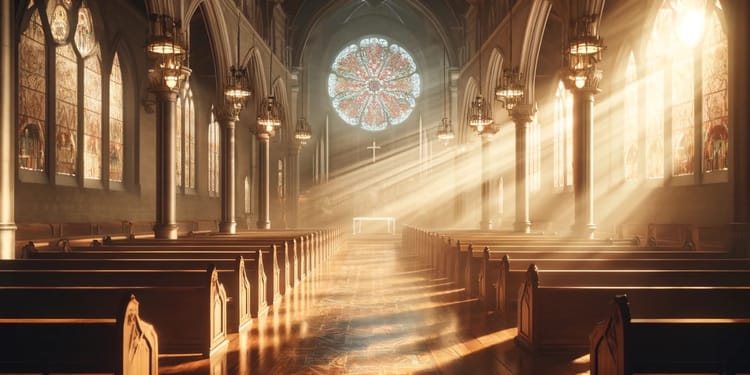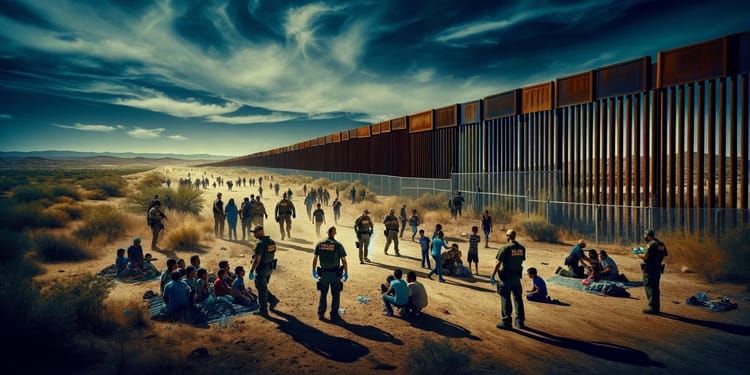Fairhaven Sermon 9-10-2023
Summary
Rev. Peg Bowman shares that she was requested by her book club to give a sermon on immigration after they read a book about a woman who helped asylum seekers. Rev. Bowman explains her interest in immigration stems from learning about her own family’s immigration history and hearing about the tragic fate of Jewish refugees on the St. Louis who were turned away from the US during WWII. She laments that worldwide, there are over 100 million displaced people today fleeing war and persecution, with most going to nearby countries. The US sets low refugee acceptance rates compared to the past. Rev. Bowman is troubled by detention centers that profit off immigrants and offer poor conditions.
What brings Rev. Bowman the most joy in this effort is that through her work in the community, she has had the privilege of getting to know many immigrant families personally, and has found them to be wonderfully good, hardworking people – including a mother and father from South America whose children are winning awards at a local school, and a courageous mother around Rev. Bowman’s age who traveled back to Ukraine to rescue her son. Her book club will now write letters to detainees since receiving training. Rev. Bowman encourages showing God’s welcome to immigrants, visiting detainees, and remembering each person is made in God’s image. She hopes the US will act with justice, mercy and humility.
Transcript
I’m going to be doing something a little bit different this morning. I am taking a request. You know, the way musicians do, you put a little jar up there, right? So this month I had a request from more than one person, actually, but more importantly from our new book club. The book club has been reading a book called The House That Love Built.
It’s a very moving and true story of a young woman in Denver, Colorado, who, without realizing It rented an apartment across the street from a detention center for people who have applied for asylum in the United States and who are waiting for their cases to come up in court. It tells the story of how this young woman named Sarah would see people on the streets who had been approved to stay and live in the country, and they would come out of the the door of the facility with paperwork in hand and their clothing and not much more. And very few spoke English and very few had money and none of them had any idea how to find their loved ones in this country. So Sarah began to watch for these people as they were released and she invited them into her apartment to make a phone call or to grab a bite to eat or to figure out how to get to their families.
And sometimes if their family was far away, people would sleep on her sofa until someone would come and get them. Long story short, after some time and with help from a lot of friends, a house was bought and fixed up for the people who were being released from this facility. And people from over 300 countries have now stayed in that house. They call the place Casa de Paz, which means House of Peace.
And the Casa to depose is still open and running today. So our book club made a request then. They said to me, preach a sermon on immigration. I’ve thought about doing this in the past, and I have resisted the idea, mainly because I respect and support the separation of church and state.
And in this country, we separate politics from faith for a lot of good reasons. We learn to worship God and not politicians. We learn that we vote for politicians but not for God because God is the King of kings and Lord of lords and never needed to be elected. But today, the sermon is a yes to our book club’s request.
The first question that people usually ask me when I talk about immigration is, why are you interested? What’s it to you? And my interest in immigration started when I was a kid, learning the stories of our family who came to America in the 1800s. My father’s family left the island of Guernsey and moved to Philadelphia. My mother’s family left Switzerland and moved to the suburbs of New York. And I heard their stories growing up, and I appreciated the richness of those stories and all of the things that our ancestors did to build a better life for our family.
I could preach a sermon on just that. And just about all of us here have stories like this in our own families. Every American knows how to answer the question, where are you from originally? No one from any other country or continent on this planet has a clue what Americans mean by that question, let alone being able to answer it. We are unique in that way.
Another thing I remember from my youth, probably high school years I would guess, is when dad told us about a ship called the St. Louis that came to America from Europe at the beginning of World War II. Now, dad was a serviceman, but he served during Korea. He was too young to serve during World War II, but he remembered World War II.
And so he told us the story of this ship that carried almost 1,000 Jewish people away from the Nazis across the Atlantic. and they were hoping to find a safe place here on this side of the Atlantic. But Cuba turned them away. The United States turned them away.
Canada turned them away. And the ship was eventually forced to return, turn around, go back to Europe. And some people got off the boat in England. They were the lucky ones.
The rest landed in Belgium. And shortly after that, the Nazis took over Belgium. And it is estimated only 87 of those people were able to get to safety. The rest died at the hands of the Nazis.
If we had only made room for not quite 1,000 people, we could have saved every one of those lives, plus the generations that would have come from them. We who believe in God look at this part of our past, of our history, and we say to the world, never again, never again. But the thing is, it’s happening again. And don’t get me wrong, most Americans are good, caring people.
We hear the words of Jesus when he says, I was a stranger and you welcomed me. We get that. But somehow this doesn’t translate into reality when outsiders come into contact with our institutions and our borders and our media and our legal systems. Somehow God’s call to love the stranger because we were once strangers ourselves gets tangled up in red tape and too often in violence.
And we need to do better than we’ve done in the past. And I believe that we can. Another thing that troubles me is just taking in sort of the worldwide view, the big picture of global immigration. Things are much worse now in many parts of the world than they were in Europe at the end of World War II.
At the end of that war, some of you might even have heard the stories about this. There were millions of people displaced from their homes and their countries. There were children who had been forced from their parents. There were survivors of prison camps.
There were POWs and MIAs from many countries. There were children who had been sent to foreign countries for safety. And all these people at the end of the war had to somehow find their way back home across land that had been bombed into rubble. And it often took years to reunite those families, if indeed reunion was possible at all.
Today, in many parts of the world, things are worse. And just to give a few examples, in countries like Myanmar in Asia, there’s a civil war and civilians and children are considered fair game as targets in that civil war. And in the Democratic Republic of Congo in Africa, the DRC, rape has become a weapon of war. Over six million people in that country have died since that war started.
You hear me pray for these places sometimes in the prayers. They need our prayers. Many of us can remember a few years ago in the news that terrible photo of that young Syrian boy lying face down on the sand. And many of us remember the words of the poet who wrote, no one puts their children in a boat unless the water is safer than the land.
That photo was taken eight years ago. And the situation in Syria has not improved. We don’t hear about it in the news anymore. But the civil war is still going on.
Over three million people have left Syria, running for their lives, running away from a government that drops bombs on its own people. So the situation is worse now than it was at the end of World War II. In total, the United Nations estimates there are over 108 million displaced people in the world today. I mean, that’s beyond imagining.
We can’t even picture 108 million people. There’s 108 million people who cannot go home if they want to stay alive. Now most of these folks don’t want to come to America because America’s too far away and too expensive to get to, takes too long. Most refugees travel to a country close to home, which makes sense.
And this explains why the top five receiving countries in the world right now, the countries who allow refugees in are Turkey, Iran, Columbia, Germany, and Pakistan. Those are the top five in that order. And all of these countries have welcomed more than a million refugees. What troubles me is why we’re not doing more.
Our government sets limits every year on how many refugees the United States will take in. The highest number in recent history, and this one surprised me, was under Ronald Reagan back in 1980. When the limit was, we received 230,000 people, not quite a quarter million. In 2020, 40 years later, the number was only 18,000.
And I can’t help wondering why the greatest country in the world isn’t doing better than that. And I don’t think it’s because we don’t want to. I recently visited the website of the city of El Paso, Texas, which has been in the eye of the immigration storm for years. Pardon me.
their website says this about the refugees who come there. The city of El Paso places our priority on the individual migrant, providing water and food, connectivity, transportation assistance, and temporary shelter if needed. The people crossing the Rio Grande come from all parts of the world to escape economic devastation, and extreme crime. Their website goes on to say that El Paso receives approximately 900 people every day, which works out to over 300,000 per year.
Now this does not mean that 300,000 people have moved into Texas. They’ve crossed the border at Texas. Some go to work every day and come back across to Mexico to go home. Most want to emigrate, so they apply to emigrate, either as immigrants or as seeking asylum, and then many return to Mexico to wait.
Some people who request asylum, which is legal to do, these folks are sent to holding facilities, detention centers around the country to wait to have their cases heard in court. And this can take months, which is where our book club book, The House That Love Built, comes in. Asylum can be granted to these folks if that person can prove persecution or threat of bodily harm based on race, religion, nationality, political opinion, or membership in a particular social group. The city of El Paso is doing their best to help and so is the city of Juarez across the river in Mexico.
The detention centers, however, have become what’s called a growth industry. They are not government-run. They are for-profit facilities, usually built in rural areas to provide jobs. We have four of them in Pennsylvania, on the eastern end of the state.
The detention centers are like jails in everything but name. And because they’re built for profit, the owners keep the budgets as lean as possible, which means poor food and poor medical care for the people inside. These people who are guilty of nothing find themselves without rights, not even the right to a lawyer or a phone call. So immigration concerns me because I care about justice and fairness and humane treatment for people in need.
And finally, the last and best reason that I’m involved in working with immigrants is because the people I’ve met who are newly arrived here in our community are amazingly good people. They are hardworking, family-oriented, salt of the earth, men, women, and children. To share the stories of just a couple of them, there’s a mother and father from South America who live in Carnegie, whose children have been winning awards in a local elementary school. Then there’s another mother about my age who’s from Ukraine who went back over to the old country this past summer and risked her life to find her son and bring him here, to bring him home to safety.
She’s got so much guts. And there’s so many more real life stories of wonderful people who live in our neighborhoods and work in our neighborhoods. As we’ve heard in the scriptures today, God teaches us to show kindness and show welcome to the stranger. God talks about justice.
And what I hope to do, what I hope to continue to do, is to show God’s welcome and God’s caring, even if it’s just in small ways. And when we’re open to doing something, when we’re willing to follow the Lord’s leading, opportunities come. And that includes our little book club. As we were reading and sharing over this book that we were reading, one of us discovered that the house that Love built has a ministry to the people in these detention centers called Cartas de Paz, or Letters of Peace.
And so I sent an email to the Casa to ask them about this, and long story short, one of their volunteers ran a training class for our book club via Zoom this past Tuesday, and now we can help with this. We had to be trained because it’s not legal for individuals to write to people in detention directly, but we can write to them through the Casa de Paz. And sending a greeting card or a quick letter might seem like a very small thing, but it’s a huge thing for people receiving them. Being shut up in a detention center for months, often without contact from family or friends, can wear a person’s soul down.
Please keep these folks in your prayers. Keep our national leaders in your prayers and pray that we as a nation will do justice and love mercy and walk humbly with our God. Amen.
Just one letter, even from a stranger, can bring light and caring to someone who is very lonely. This is water to the thirsty, if ever there was. Someday, every one of us, myself included, will answer the questions that Jesus asks about in our gospel reading today. Jesus says, I was hungry, I was thirsty, I was a stranger, I was naked, I was sick, I was in prison.
Jesus identifies with the poorest and the weakest, the homeless and the imprisoned. These are the people Jesus came to be with and can be found with. And where Jesus is, that’s where I want to be. And as your pastor, I encourage you to join me there, join us there in any way that you are able.
So I want to encourage everyone, when the subject of immigration comes up in conversation, to remember that each one of these millions of people who have no country and have no home to go to, each one is a person made in the image of God, someone who Jesus loves. Remind people of that when you have the chance. Barack Obama once said, A child on the other side of the border is no less worthy of love and compassion than my own child. And I couldn’t have said it better.


